

The liver is a crucial organ that filters blood and has a role in many essential functions of the body. It is one of the largest organs which can be regenerated. The liver needs a replacement when it does not function or liver failure. It stops functioning because of the damage caused to the liver due to some diseases. Liver cancer, viral hepatitis disease, biliary atresia, metabolic disorder, hepatocellular carcinoma, and liver cirrhosis can lead to end-stage of the liver. When the liver fails due to diseases, it loses its ability to regenerate. Hence, it needs complete removal and replacement. This procedure is known as liver transplant. If not transplanted, the disease can further complicate and can cause life-threatening complications in the body. After a person has been diagnosed with cirrhosis, it's important to wait until they are healthy enough to receive a liver transplant.
Every year nearly 200,000 patients require liver transplant surgery. Despite the huge demand for liver transplant donors, the number of transplants has decreased over the past few years. This has caused many people to wait longer and longer to get a transplant. However, there are 2-3 procedures for a liver transplant. One is a living donor liver transplant, which reduces waiting time and increases the life of the patient.
The African continent lags in organ transplant surgeries, due to a lack of healthcare resources and high prices. In addition, due to the socioeconomic challenges many patients fail to receive a healthy liver and die due to their diseased condition. According to the study, acute and chronic liver disease cases are expected to increase. Hence, the need for liver transplant surgery will also increase, especially in children.
A liver transplant surgery in India is the one where the patient's diseased liver is entirely replaced by a whole or partially healthy liver from another person. with a whole or partial healthy liver from another person. In most cases, the healthy liver that is implanted on the patient comes from someone who has just died. But in another case, a healthy living person may donate part of their liver. In order to be eligible as a liver donor, the blood match of the donor and the patient must match.
A 4-month-old baby was suffering from liver disease at birth. By the time the parents reached India, the disease leads to liver cirrhosis. The mother donated a part of her liver to the baby. Now, they have recovered well and are back in their country. Surgeon Dr. Giriraj Bora and his team have performed the living donor liver transplant surgery in India. Watch their testimonial in this video:

A Syrian patient suffering from Wilson's disease came to India to receive treatment. She underwent a successful liver transplant surgery at Fortis Hospitals, India, Gurgaon. The liver transplant surgery was performed by one of the best liver transplant surgeons in India, Dr. Vivek Vij. Her brother donated to her because her father and mother were not suitable as donors. She returned with her family after a successful liver transplant.

A couple from Morocco came to India for the treatment of their 4-month-old baby girl suffering from biliary atresia. She was admitted to the emergency room and her mother became her liver donor. She underwent a successful pediatric liver transplant surgery in India at the JCI-accredited Artemis Hospital in Gurgaon, India. The operation was performed by India's leading liver transplant surgeon Dr. Giriraj Bora and she returned in good health with her parents.

The liver helps metabolism, filtering toxins from the blood, creating bile, and helping the body produce red blood cells. No one can survive after a liver failure occurs. However, through a liver transplant surgery in India, a person can regenerate the liver and lead a regular life. Some of the conditions for liver failure include liver cirrhosis, hepatitis, and fatty liver disease. There are many conditions that a hepatic transplantation can help with.
The most common disease of the liver is cirrhosis. Cirrhosis is a liver disease in which the liver becomes scarred and damaged, which can lead to cirrhotic portal hypertension and eventually liver failure. Liver transplantation is usually only recommended for those who have end-stage liver disease and are at risk of dying from complications of cirrhosis.

A person can't live with a non-working liver. If your liver functionally degrades to a point where it doesn't work at all, you will be strongly considered for a liver transplant surgery in India. A patient should be considered for liver transplant surgery if the following conditions are present:
The liver is the body's main organ for removing toxins and filtering blood. If your liver is not functioning properly, you may be at risk for developing conditions such as cirrhosis, hepatitis, fatty liver disease, and more. Many symptoms indicate that you have a problem in your liver. However, the most common symptoms that the patients have when the liver fails are listed below:

■ Fluid Retention: One function of our liver is to balance fluid in our body. A healthy liver synthesizes proteins including albumin. Albumin and other proteins retain fluid or water in vascular space through osmosis. But, in the case of liver cirrhosis, low albumins fluid out of the blood vessels, which are not re-absorbed. Fluid, therefore, accumulates in other tissues and body parts. Fluid retention is also termed 'Edema'.
■ Gastrointestinal Bleeding: When a liver becomes scarred, it resists the blood flow in the liver. This resistance leads to increased pressure on the portal venous system. Hence, the blood flow finds other routes to flow with increased pressure. As a result, small veins outside of the liver become fragile due to abnormal blood flow pressure. These weak veins are prone to cracking and bleeding which is life-threatening.
■ Jaundice: A liver eliminates degradation products of hemoglobin. Bilirubin is one of those degraded products which the liver eliminates. Bilirubin is not detoxed through a failed liver. This incident leads to an increase in bilirubin in the blood. Hence, our tissues and bodies become more yellowish.
■ Metabolic Encephalopathy: The term “Encephalopathy” means organ damage that affects the brain. When liver failure occurs, the liver cannot clear body toxins. Those toxins accumulate in one place and affect brain function. As a result, a person can experience confusion or coma.
■ Extreme fatigue, tiredness, and loss of appetite.
■ Diarrhea, vomiting and extreme weight loss.

Dr. Giriraj Bora is one of the famous Gastrointestinal Surgeons and Senior Consultant in India. He has done over 1,500 liver/hepatic transplants successfully for national and international patients.
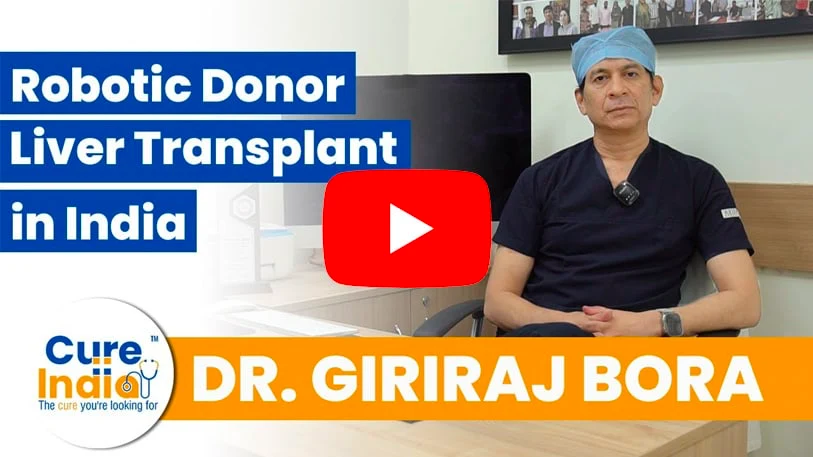
Dr. Abhideep Chaudhary is a renowned liver transplant specialist. He is an expert in providing advanced liver transplant surgery for treating liver diseases like Hepatitis B, Hepatitis C, and Liver Cancer.
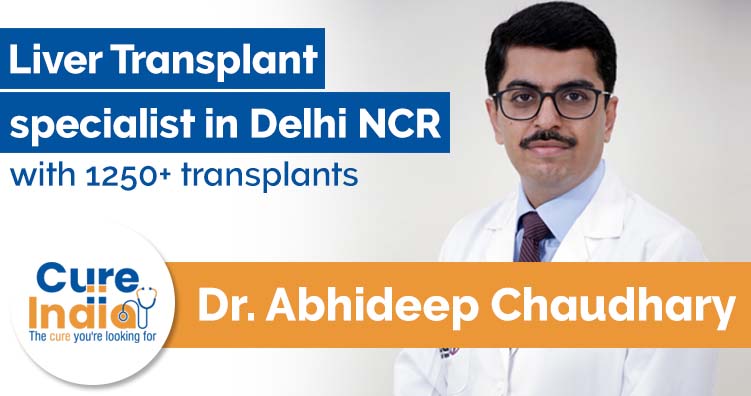
Dr. Arvinder Singh Soin Dr. Arvinder Singh Soin is the leading and most experienced liver transplant surgeon in India. Along with his team, he performed about 20 to 30 liver transplant surgeries with a success rate of 95 percent in one month. He and his team perform almost 25-30 liver transplants in a month with a 95% success rate.

Dr. Vivek Vij is a liver transplant specialist in Delhi NCR, India. He is a pioneer in the transplant surgery of the liver and an expert in laparoscopic donor hepatectomy surgery. He delivers liver donor surgery with 100% safety protocols for the donors. He is a pioneer in liver transplant credited with liver donor surgery with 100% safety protocols for donors. He has expertise in laparoscopic donor hepatectomy.

Dr. Subhash Gupta is an expert in the biliary sciences and the transplant surgery of the liver. He has many years of experience in the top hospitals in India including Indraprastha Apollo Hospital, Max Super Speciality Hospital, and more etc.

Dr. Sanjay Singh Negi is a highly qualified doctor who is a successful Hepato-pancreato-biliary and liver transplantation doctor. He is an expert surgeon with expertise in Laparoscopic and Gastrointestinal surgeries, hepatobiliary surgeries, etc. including many complex surgeries for the liver.
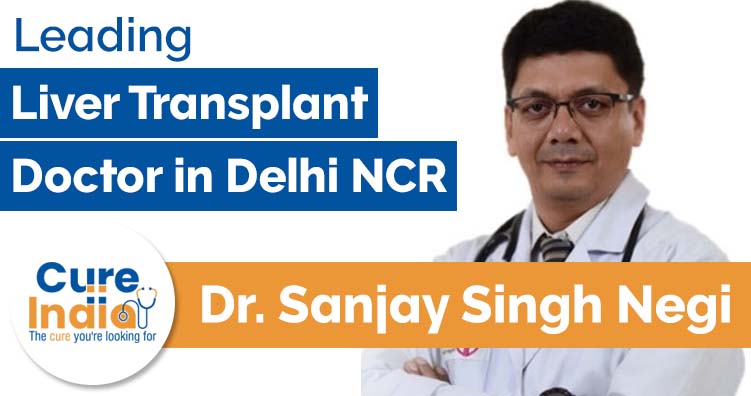
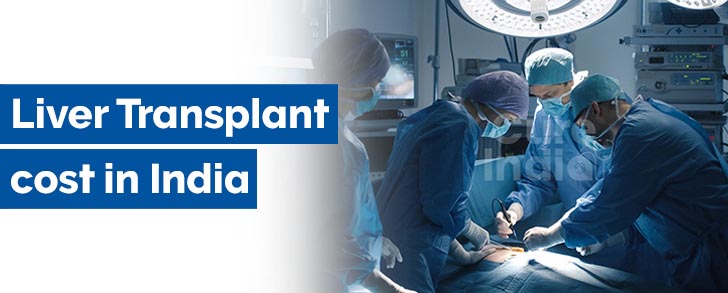
From many African countries like Ethiopia, Cameroon, Tanzania, many people travel to get liver transplant surgery in India every year. The liver transplant surgery cost in India is the cheapest in the world, making India a boon for international patients. Surgeons in India regularly upgrade their knowledge and skills to maintain premium service for their patients. Indian liver transplantation hospitals have the latest arrangements and facilities, which help provide supreme medical care for liver transplant surgery procedures like split liver grafts, marginal or extended criteria donors, LDLT, and other basic procedures available in India. The liver transplant surgery cost in India is listed below.
| Treatment | Cost in India | Stay in India |
|---|---|---|
| Liver Transplant Surgery in India | $24,000 - $28000 | 45-60 Days |
The liver transplant surgery in India is performed in different ways depending on the availability of a donor's liver and the patient’s circumstances. There are 3 primary transplantation types for a liver which are mentioned below:
This type of liver transplant surgery involves receiving a healthy liver from a deceased person (died individual) who has given consent to donate the organ while he/she was living. The livers obtained from the deceased individual are mostly used for transplanting the whole liver.
It is a type of transplant in which part of the liver is donated by a healthy and living liver transplant donor to the recipient (patient). Even if the major portion (90%) of the liver is removed from the body, the remaining part of the liver can regrow and attain its normal size. This method of transplant is used when the deceased donor is not available.
This is a specialised liver transplant surgery procedure in which the donor’s liver is split or divided into two parts, one part is transplanted in an adult patient and another part is transplanted in a child (pediatric liver transplant). In this case, the deceased person’s donated liver is used. This is a great approach that makes it possible to provide the transplanted liver to more than one patient from a single donated liver.
After a consultation, an expert doctor may ask for the following tests or examinations.
Diagnosing tests for the liver transplant surgery also include:

People can donate the part of their liver to a person whose liver has failed and needs a healthy liver if they wish to. The liver will regenerate over time within 2 to 3 weeks and hence there are no complications of donating a liver. However, not everyone is eligible to donate a liver. To become an eligible liver transplant donor in India, you need to meet certain criteria. The criteria for a liver transplant donor in India are:
■ The donor must be a relative. This fact helps fulfill the conditions like body size and from the same geographical area. The donor must happily donate a part of his or her liver for altruistic reasons.
■ The donor must be within the age range of 18-50 years. Also, he or she is healthy, fit, and has compatible or matching blood groups. Here is the chart that shows blood group compatibility.
| Recipient’s Blood Group | Donor’s Blood Group |
|---|---|
| A+ / A- | A+ / A- / O+ / O- |
| B+ / B- | B+ / B- / O+ / O- |
| AB+ / AB- | Any Group |
| O+ / O- | O+ / O- |
■ Also, the donor must be an adult and psychologically sound for deciding whether she or he wants to become a liver transplant donor or not.
■ After that, some tests are asked to be done to evaluate the donor. In Level I evaluation blood group, HBsAg, Anti HCV, HIV I&II CBC, LFT, Urea, Creatinine, PT/ INR, HbA1c, Lipid profile, Serum T3, T4, and TSH.
■ Evaluating Level I tests, some tests are to be done at the center.
Due to the increase in liver diseases worldwide, there is a high demand for liver transplant surgery in India. However, not everyone who wants to receive this surgery will get one. The best liver transplant surgeons in India want to provide the best and most successful medical services to their patients. For that, the patients will need to meet certain criteria to qualify for a liver transplant surgery in India. The minimum and common requirements or criteria to be eligible to receive a transplant procedure of a liver are as follows:
Liver transplant is a complex surgical procedure that requires a highly experienced and skilled surgical team in the best hospital for liver transplant. CureIndia's best liver transplant surgeon will perform the surgery by first administering anesthesia to the donor and the recipient to keep them unconscious to achieve a pain-free surgery.
Then the surgeon will make the incision on the patient’s abdomen. The patient’s liver is carefully removed from the body by first disconnecting it from the blood vessels and bile ducts. Following that, the donor’s liver is prepared and implanted in the same location as the patient’s liver. This is known as an orthotopic liver transplant surgery in India.
After reaching this stage, now there is a time to connect the implanted donor’s liver to the blood vessels and the bile ducts of the patient’s body. This is done by suturing them together. Now, the final step is to ensure that the implanted liver is functioning correctly without any bleeding or leaks and close the incision with the stitches.
With the advancement of technology around us, liver transplant surgery in India is also becoming more advanced and minimally invasive. In India, the three liver transplant surgery methods that are usually practiced are:

In this method, surgeons first operate on the donor. Then remove a portion of his or her liver. After that, the recipient gets an operation to remove the liver and place the donor’s liver.
This liver transplant surgery in India is minimally invasive. It is also an open surgery where surgeons make an incision in the abdomen. The whole surgery happens through that incision. In addition, the incision is not more than ½ inch in length.
The robotic system is used here to aid surgical procedures. It is also a minimally invasive method. Surgeons make a tiny keyhole through which he or she puts a camera and other surgical instruments. The surgeon observes the surgery procedure through a video monitor and controls robotic arms manually for the operation. Surgeons performing Da Vinci Robotic surgery can see anatomical structures in their natural colors through a high-resolution 3D vision system.
Right after a liver transplant surgery, the recipient and donor are both shifted to an intensive care unit for a few days. The stay in the ICU depends upon the condition of the person after surgery. At this time, doctors and nurses will monitor the condition of both donor and recipient. After 5-10 days, the liver continues to recover. Then, the recipient and donor undergo frequent checkups and blood tests a few times a week. With time the checkups and tests become less frequent.
15-20 days after surgery, the recipient can go back home from the hospital. And the donor can return home after staying 8-10 days in the hospital under medical supervision.
However, a recipient's full recovery requires 6 months or less after liver transplant surgery. Liver transplant donors will recover within 1.5 - 2 months. After that, the recipient can resume work life. The recovery time varies on the condition of the recipient's health before the surgery. Recipients need to take immunosuppressant drugs for their entire life.
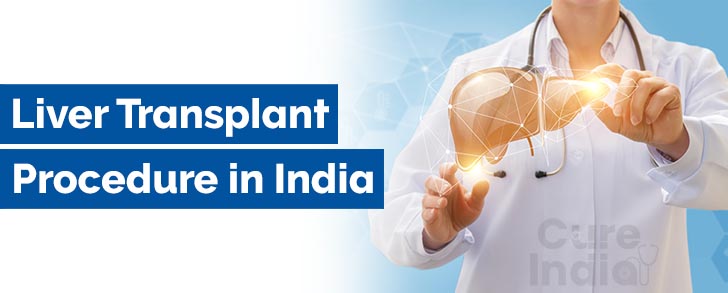
Pediatric liver transplant surgery is quite similar to adult liver transplant surgery. However, the children face new challenges which need extra care. On the other hand, pediatric liver transplant has a greater success rate. Some drugs are suggested by doctors to prevent rejection. After that, the child must go through post-transplantation care. The post-transplantation care involves the reference and collaboration of pediatricians, pediatric transplant hepatologists, transplant surgeons, nurses, transplant coordinators, and psychologists.


Successful Liver Transplant Surgery in India
Share Your Reports
Minimally invasive Liver donor surgery
Book appointment